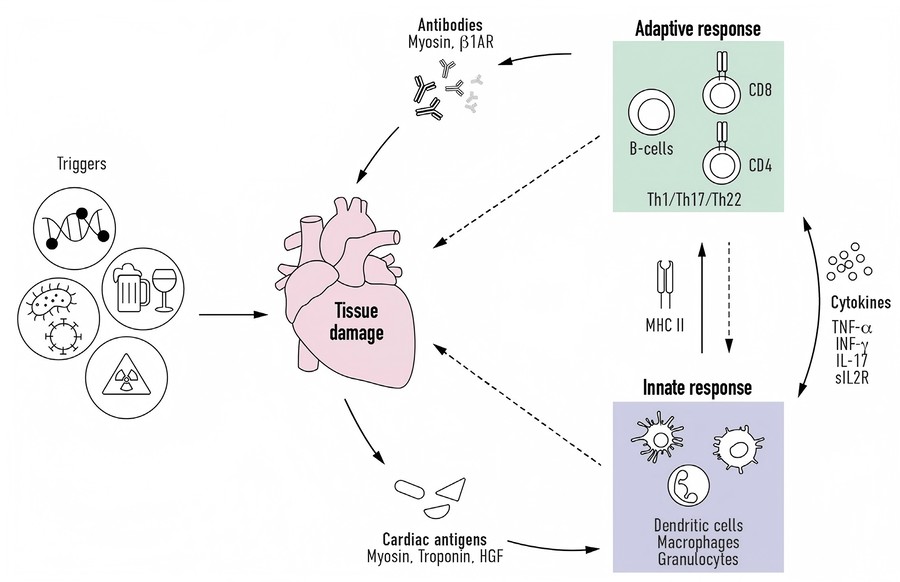Dilated Cardiomyopathy
Dilated cardiomyopathy is a disorder of the heart muscle that involves the widening and/or dilation of the left ventricle of the heart along with left ventricular or biventricular systolic dysfunction. These uncommon cardiovascular problems like dilated cardiomyopathy pose particular challenges in the realm of drug discovery and development, Protheragen as a specialized research service provider can offer comprehensive solutions for therapy research.
Overview of Dilated Cardiomyopathy
Myocardial contractile dysfunction, alongside ventricular dilation, characterizes dilated cardiomyopathy. It is one of the most common forms of cardiovascular disease (CVD) associated with heart failure. The characteristic feature of dilated cardiomyopathy is the impairment of systolic function and the dilation of the left or both ventricles devoid of identifiable causative factors. One epidemiological study cites the prevalence of dilated cardiomyopathy as 36.5 in 100,000 individuals and the male-to-female ratio was 3 to 4.
 Fig.1 Illustrates immune responses in dilated cardiomyopathy. (Harding, D., et al., 2023)
Fig.1 Illustrates immune responses in dilated cardiomyopathy. (Harding, D., et al., 2023)Pathogenesis of Dilated Cardiomyopathy
Dilated cardiomyopathy may result from various factors including genetic mutations, chronic alcoholism, certain chemotherapeutic drugs, and sometimes even pregnancy. Roughly 40% of the familial cases of dilated cardiomyopathy show pathological changes that follow mainly an autosomal dominant mode of inheritance. While dilated cardiomyopathy is linked to over fifty genes, the most important ones are certainly TTN, LMNA, TNNT2, and MYH7.
 Fig.2 Overview of dilated cardiomyopathy. (Harding, D., et al., 2023)
Fig.2 Overview of dilated cardiomyopathy. (Harding, D., et al., 2023)
Therapeutics Development for Dilated Cardiomyopathy
| Drug Names | Mechanism of Action | Targets | NCT Number | Research Phase |
|---|---|---|---|---|
| Bromocriptine | A dopamine agonist that suppresses prolactin release and can effectively avert the development of peripartum cardiomyopathy. | DRDs | NCT06250257 | Phase III |
| Ifetroban | Facilitates vasodilation while suppressing inflammation which enhances cardiac function. | TXA2, PGH2 | NCT03340675 | Phase II |
| Ivabradine | Improves ejection fraction by reducing heart rate. | HCN channels | NCT02973594 | Phase IV |
| ARRY-371797 | Decreases NT-proBNP, a cardiac biomarker, and increases functional capacity in individuals suffering from LMNA-related dilated cardiomyopathy. | p38 MAPK | NCT03439514 | Phase III |
Disclaimer: Protheragen focuses on providing preclinical research services. This table is for information exchange purposes only. This table is not a therapy plan recommendation. For guidance on therapy options, please visit a regular hospital.
Our Services
Leveraging our advanced infrastructure, we can assist you in the research of cardiovascular diseases by offering professional personnel. So that researchers have all the requisite tools and services for their investigation, we offer diagnostic development, therapeutic development, and the development of disease models. We seek to augment preclinical study efforts by assisting in the discovery of biomarkers and therapy exploration through extensive support.
Therapeutic Development Services
Diverse Platforms

Animal Model Development for Dilated Cardiomyopathy
For effective study and therapy development of dilated cardiomyopathy, developing appropriate animal models is essential. In our firm, we create custom animal models of dilated cardiomyopathy that are both inducible and genetically engineered to meet the particular requirements of the client's research.

These models include transgenic or knockout animals which are created through genetic engineering to observe the impacts of certain gene alterations related to dilated cardiomyopathy.
Optional models:
- Lmna mutation model
- Nexn mutation model
- Tbx5 mutation model
- Other models

These models utilize external agents like toxins and viral infections to replicate the pathology of dilated cardiomyopathy and observe its progression and potential therapy strategies.
Optional models:
- Doxorubicin-induced model
- Cardiac myosin-induced model
- CVB3 infection model
- Other models
Aside from providing drug discovery related services, Protheragen also provides comprehensive preclinical services such as pharmacokinetics and drug safety evaluation. Our unwavering focus on quality and its impact on outcomes and deliverables drives efficiency. With us, you can expedite your research efforts to develop new therapies for dilated cardiomyopathy. Reach out to us for further details on how we can help you.
Reference
- Harding, Daniel et al. "Dilated cardiomyopathy and chronic cardiac inflammation: Pathogenesis, diagnosis and therapy." Journal of internal medicine 293.1 (2023): 23-47.
For research use only, not for clinical use.
